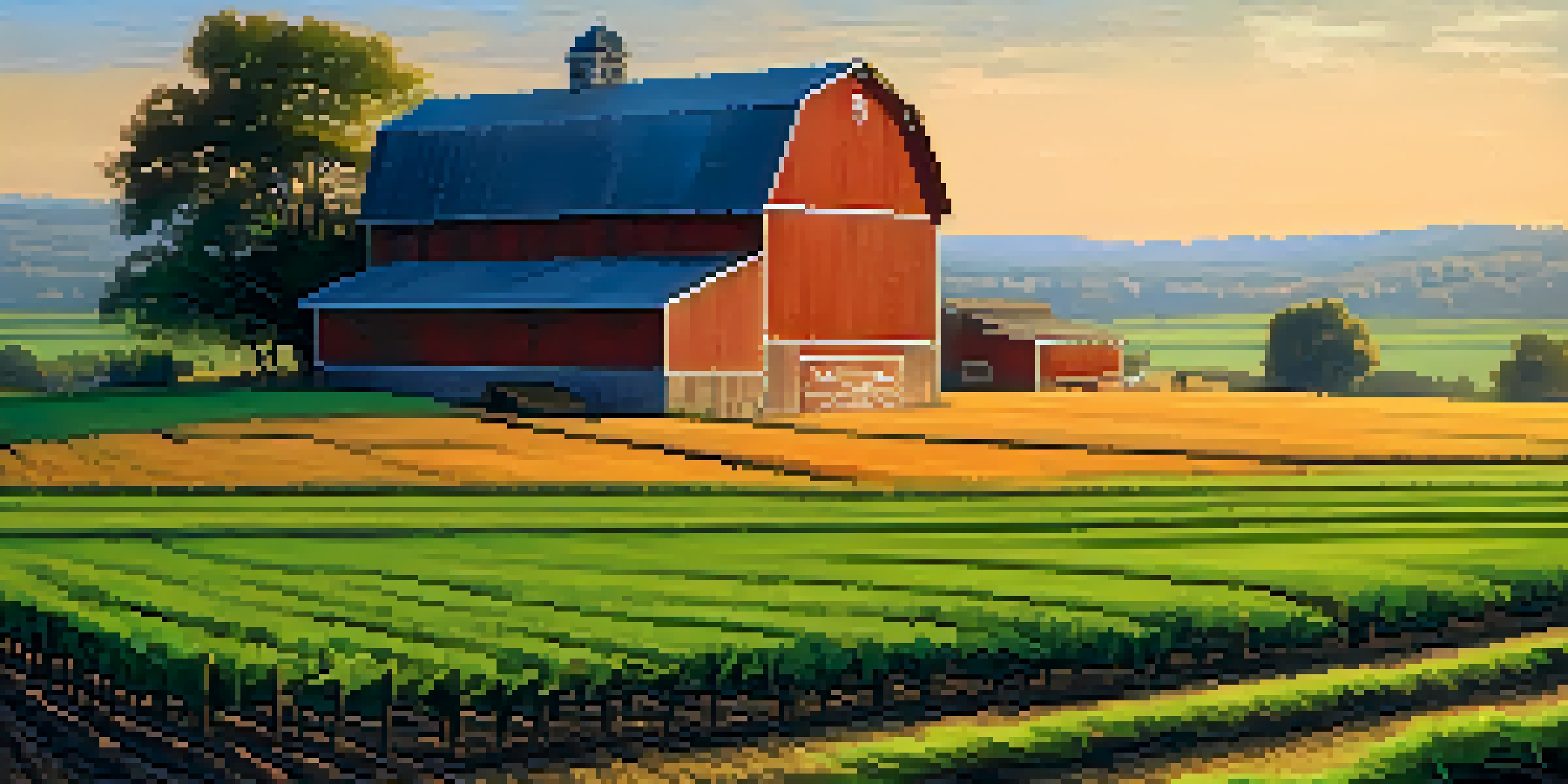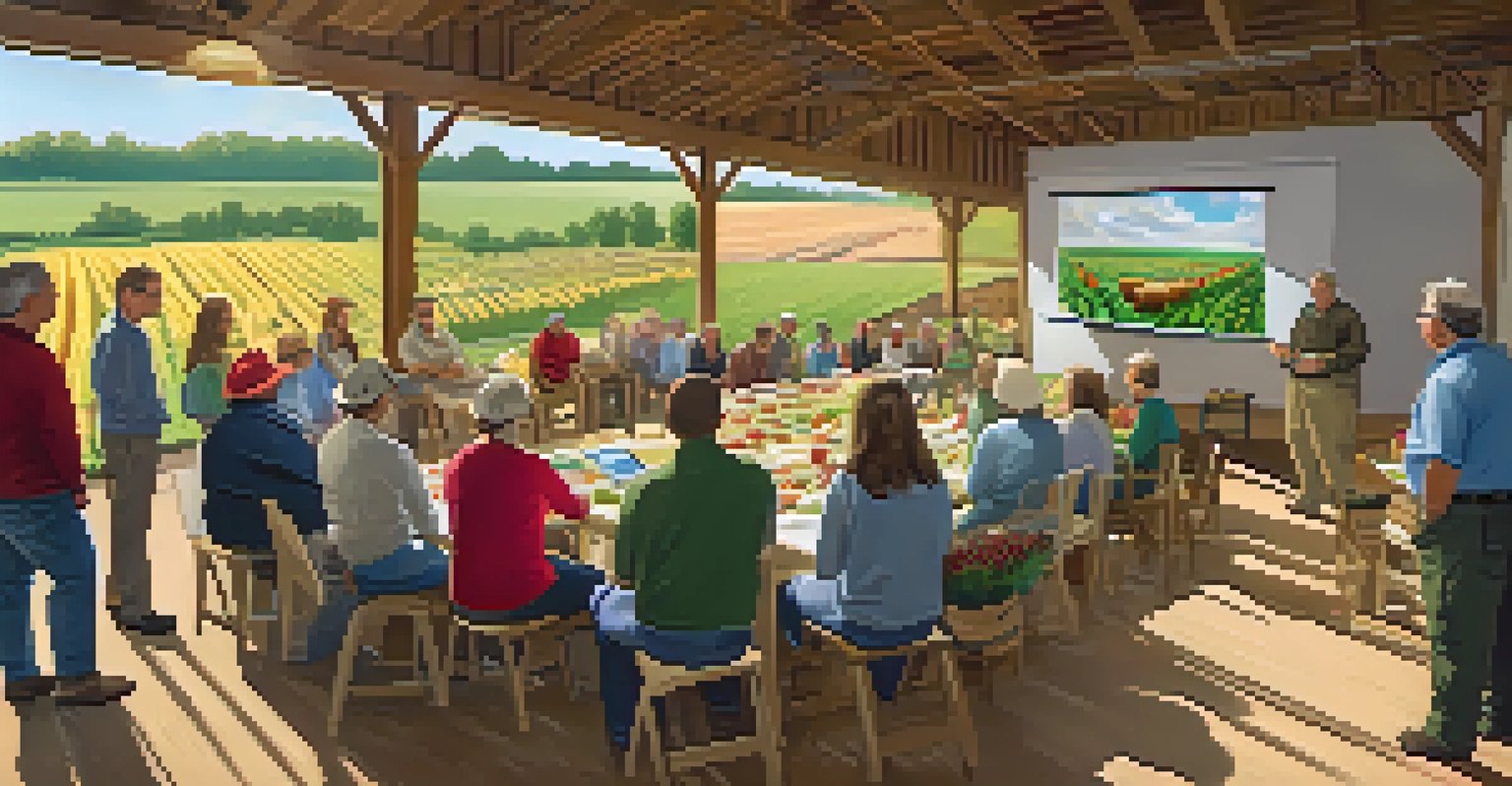NC State University: Pioneering Agricultural Research in NC

A Brief History of Agricultural Research at NC State
NC State University has a rich history of agricultural research dating back to its founding in 1887. Initially established as a land-grant institution, it aimed to provide education and research focused on agriculture and engineering. Over the years, the university has evolved, yet its commitment to advancing agricultural practices has remained steadfast.
Agriculture is the foundation of our economy and the key to our future.
The establishment of the College of Agriculture and Life Sciences (CALS) in 1925 marked a significant milestone, allowing NC State to focus more on agricultural education and research. This college has since become a hub for innovative research, attracting funding and partnerships that enhance its capabilities. Today, NC State's agricultural programs are recognized nationally and internationally for their contributions to the field.
Through various research centers and initiatives, NC State has positioned itself as a leader in agricultural advancements. The university's work has not only benefited North Carolina's farmers but has also influenced agricultural practices around the world. This legacy continues as NC State adapts to the changing agricultural landscape with cutting-edge research and technology.
Cutting-Edge Research Initiatives at NC State
NC State is at the forefront of several groundbreaking agricultural research initiatives aimed at solving pressing issues. From developing sustainable farming practices to enhancing crop resilience against climate change, the university’s research focuses on practical solutions that can be implemented by farmers. For instance, researchers are exploring innovative biotechnology to improve crop yields and reduce the reliance on chemical pesticides.

One notable initiative is the Plant Breeding and Genomics program, which focuses on developing new crop varieties that are both high-yielding and environmentally sustainable. By leveraging advanced genetic techniques, researchers at NC State are helping to ensure food security for future generations. This program exemplifies how science and technology can work hand-in-hand to address real-world challenges.
NC State's Agricultural Research Legacy
NC State University has a longstanding commitment to agricultural research, significantly impacting both local and global farming practices.
Furthermore, NC State emphasizes interdisciplinary research, collaborating with experts in various fields such as environmental science, business, and engineering. This holistic approach fosters innovative solutions that consider all aspects of agricultural production and sustainability. As a result, NC State remains a pivotal player in agricultural research, continually pushing the boundaries of what’s possible.
Sustainable Agriculture Practices Developed at NC State
Sustainability is a core focus of NC State's agricultural research, as the university develops practices that promote environmental stewardship. For example, researchers are studying cover cropping and crop rotation techniques that enhance soil health and reduce erosion. These practices not only improve farm productivity but also contribute to the overall health of ecosystems.
The future of agriculture is in innovation and sustainability.
Additionally, NC State is addressing water management issues through research on irrigation efficiency and conservation strategies. By optimizing water use in agriculture, researchers aim to help farmers cope with the increasing challenges posed by drought and climate variability. This research is crucial, especially for North Carolina, where agriculture plays a vital role in the economy.
Moreover, NC State collaborates with local farmers to implement sustainable practices on their farms. This hands-on approach ensures that research translates into real-world applications, benefiting both the agricultural community and the environment. Through these initiatives, NC State is setting an example of how research can drive sustainable agricultural practices.
Impact of NC State on Local Agriculture
The impact of NC State University on local agriculture in North Carolina cannot be overstated. As a land-grant institution, it has a deep commitment to serving the agricultural community through education and research. Programs such as the Cooperative Extension Service provide farmers with resources, training, and support to improve their practices and economic viability.
Through outreach initiatives, NC State disseminates research findings and best practices to farmers across the state. This knowledge transfer is vital, as it equips farmers with the tools they need to adapt to changing conditions and challenges in agriculture. The university's role as a trusted partner enhances its impact on local farming communities.
Innovative Solutions for Sustainability
The university focuses on developing sustainable agricultural practices and technologies that enhance productivity while protecting the environment.
Moreover, NC State’s research often leads to the development of new agricultural technologies and products that benefit local farmers. From pest management solutions to disease-resistant crop varieties, the innovations arising from NC State directly contribute to the success and sustainability of agriculture in North Carolina.
NC State’s Role in Global Agricultural Research
While NC State is deeply rooted in local agricultural issues, its influence extends far beyond North Carolina. The university actively participates in global agricultural research initiatives, collaborating with international partners to tackle global food security challenges. This commitment to global engagement underscores the importance of agriculture in a rapidly changing world.
Research conducted at NC State contributes to a broader understanding of agricultural practices and their implications for food systems worldwide. For example, studies on crop diversity and climate resilience are shared with researchers and policymakers across the globe. This collaborative spirit fosters innovation and promotes sustainable practices that can be adapted in various contexts.
Additionally, NC State hosts international conferences and symposiums that bring together agriculture experts from around the world. These events facilitate knowledge exchange and highlight the university’s role as a leader in agricultural research. By connecting local insights with global perspectives, NC State helps to shape the future of agriculture both in North Carolina and beyond.
Educational Programs That Shape Future Agricultural Leaders
NC State University offers a robust educational framework designed to prepare the next generation of agricultural leaders. The College of Agriculture and Life Sciences provides a variety of undergraduate and graduate programs that encompass everything from agronomy to agricultural economics. This wide-ranging curriculum equips students with the skills needed to tackle contemporary agricultural challenges.
Hands-on learning is a cornerstone of NC State's educational approach. Students engage in research projects, internships, and field experiences that provide practical exposure to agricultural practices. This experiential learning not only enhances their academic experience but also fosters a deep understanding of real-world applications.
Education and Community Engagement
NC State's educational programs and outreach initiatives foster the next generation of agricultural leaders and strengthen community ties to agriculture.
Moreover, NC State emphasizes the importance of leadership and community engagement within its agricultural programs. Students are encouraged to participate in service projects and leadership development activities. This holistic approach ensures that graduates are not only knowledgeable but also equipped to make a positive impact in their communities and the agricultural sector.
Community Engagement and Outreach Efforts by NC State
NC State University actively engages with local communities to support agricultural education and outreach. Through programs like the Extension Service, the university provides resources, workshops, and training sessions aimed at enhancing agricultural practices in North Carolina. This community-oriented approach ensures that the latest research and innovations reach those who need them the most.
In addition to workshops, NC State collaborates with local schools and organizations to promote agricultural literacy among young people. By introducing students to agricultural concepts and practices, the university fosters a greater appreciation for the industry. This outreach not only inspires future agricultural leaders but also strengthens the community’s connection to agriculture.

Furthermore, NC State’s commitment to community service extends to addressing food security issues. The university participates in initiatives that support local food systems and promote access to fresh produce. By engaging with the community in meaningful ways, NC State reinforces its role as a key player in both agricultural research and community development.